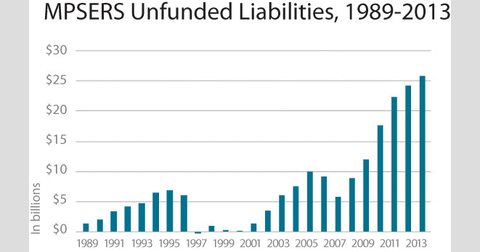Close MPSERS to Stretch Dollars Further
So far, Michigan’s gubernatorial election rhetoric has focused heavily on education funding. But funding levels are almost irrelevant when the state-mandated school employee pension system continues to soak up the extra dollars available to schools. No matter who wins the governorship in November, they should propose to close the pension system to new members — and place new hires in a defined-contribution system — in order to end this underfunding crisis and remove this burden from taxpayers.
The school retirement system is underfunded by $25.8 billion. This is about 13 times larger than the state’s general obligation bonds. Without ever having agreed to loan the state money, school employees are likely the state’s largest creditors.
This funding gap requires a substantial amount of school dollars. The annual required contributions for the school system increased from $989 million in 2009 to $1.9 billion in 2013. This is scheduled to increase to $2.3 billion in 2016, according to the latest actuary report.
Between pension benefits and retiree health care benefits administered to the pension system, 85 percent of all retirement contributions go to catching up on underfunding. The state is paying more to catch up on pension and retiree health insurance benefits than it does on its prison system.
The state needs to stop developing unfunded liabilities in the retirement systems. This can be done by converting to a defined-contribution retirement system, where the employer contributes a set amount into an employee-owned account.
In addition to allowing the employee to control his or her own retirement account, it means that they no longer have to trust that the state will set aside enough money to pay for the pensions it promises. The $25.8 billion unfunded liability is enough to show that the state has abused that trust.
Closing the retirement system prevents the state from promising benefits now and paying for them later.
Unfortunately, closing the system does not instantly resolve the underfunding issue. School districts must continue to pay off retirement benefits. But it prevents continuing to rack up these kinds of crushing unfunded liabilities in the future.
Michigan closed its non-school state employee retirement system to new members in 1997. Since then, it has developed a $6.2 billion unfunded liability for the members and retirees still receiving and earning defined-benefit pensions. But through closing the system, the state saved itself from an additional $2.3 billion to $4.3 billion in liabilities, according to a 2012 Mackinac Center study.
The state created an optional defined-contribution plan for new school employee members in 2012. Unfortunately, only 4,900 people out of the 25,200 people eligible joined the plan. This means that the majority of new school employees are creating long-term liabilities that can exacerbate the pension funding problems.
Closing the plan is a long-term solution. Eventually, that means the extra money devoted to schools will go to pay for current services instead catching up on past liabilities.
The political campaigns are focusing on the wrong factor when they discuss school funding. Instead, they ought to pitch a solution to the pension problem. Politicians and school officials should recognize that neither school employees nor taxpayers benefit from this system. Unfunded liabilities of the past are the biggest problem facing school finances today. Closing the system contains the problem and should be the focus of school discussions, not funding.
#####
James M. Hohman is assistant director of fiscal policy at the Mackinac Center for Public Policy, a research and educational institute headquartered in Midland, Mich. Permission to reprint in whole or in part is hereby granted, provided that the author and the Center are properly cited.
Michigan Capitol Confidential is the news source produced by the Mackinac Center for Public Policy. Michigan Capitol Confidential reports with a free-market news perspective.

